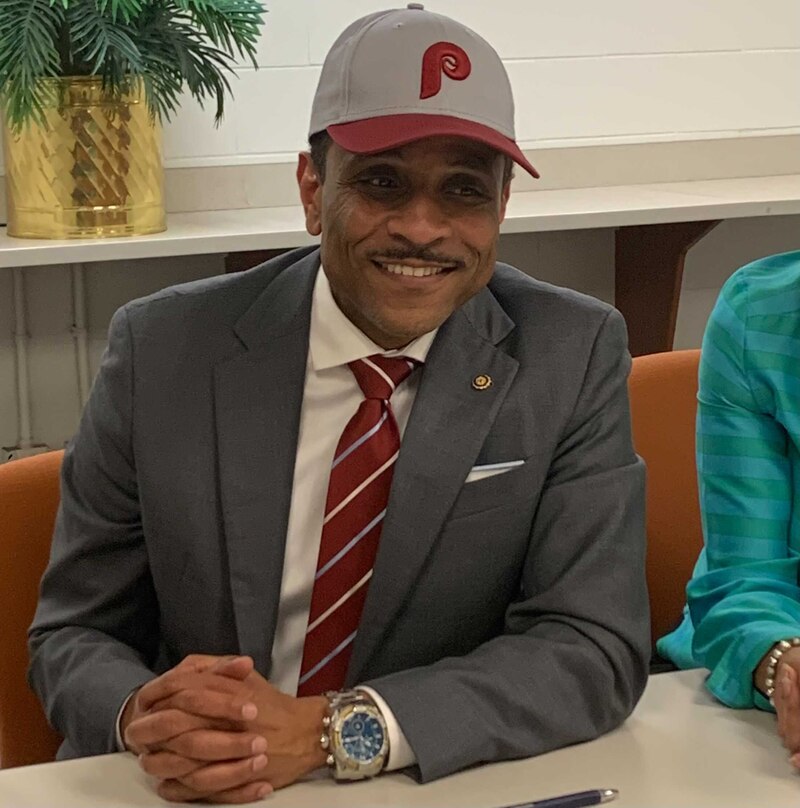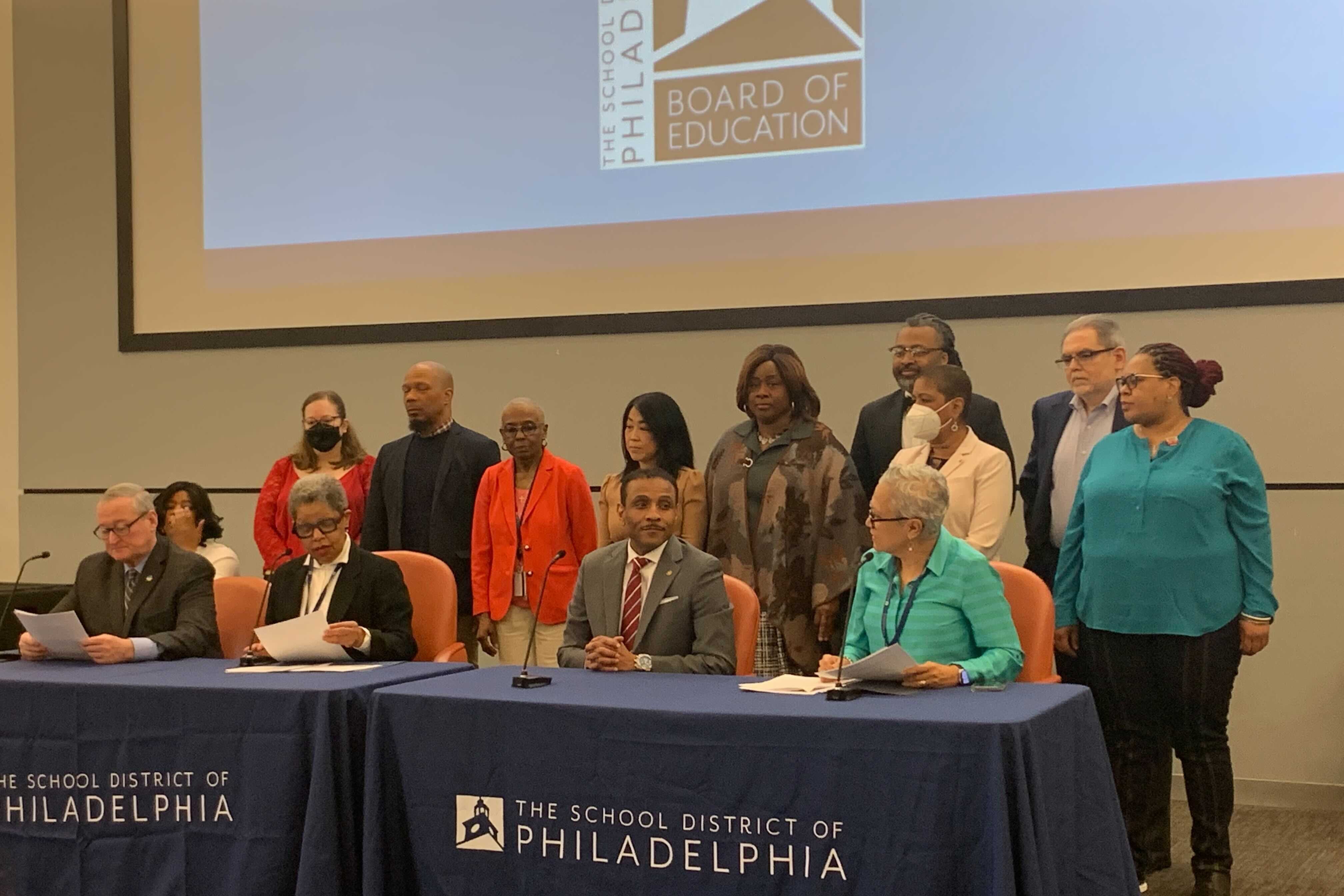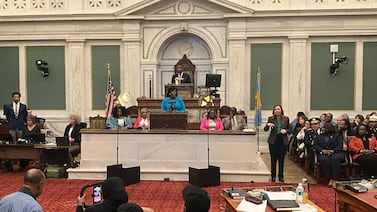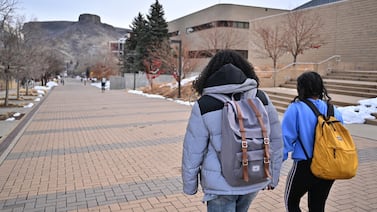Philadelphia’s school board picked veteran North Carolina educator Tony Watlington to be the city’s next school superintendent, taking over for Superintendent William Hite at a pivotal moment in the district.
He was introduced to the public at a press conference Friday morning at school district headquarters.
“I’m very excited to be here,” Watlington told the crowd of city and district officials who filled the room for the announcement. “I’m looking forward to listening and learning.”
He said he brings “a passion for student achievement” to the job, and that his mantra is to ask the same question every morning that the Maasai people ask upon waking: “How are the children?”
Board of Education President Joyce Wilkerson said that this is the right question to ask. “Our children have unprecedented challenges,” she said later, citing gun violence as one of them. “The whole question ‘How are the children?’ is complicated, but it is the right question to ask.”
Since January 2021, Watlington has led North Carolina’s 18,000-student Rowan-Salisbury school district, where many schools have been granted significant autonomy by the state over things like budgets and curriculum. In Philadelphia, he will oversee 120,000 students in one of the 20 largest districts in the country.
Watlington is taking over a district with many challenges: outdated, deteriorating buildings that haven’t been adequately maintained; a mostly low-income student body in the nation’s poorest big city; and unprecedented teacher turnover, exacerbated by difficult school conditions and an inability to match salaries offered in surrounding districts.
Regarding the need to recruit enough qualified teachers, he said, “Philadelphia is no different than other large urban areas,” he said. Such problems will not be “solved tomorrow,” he said, but will be addressed “with a sense of urgency.”
In a brief interview, Watlington said that he understands the depth of the teacher recruitment issue, which he said goes beyond Philadelphia.
“We have to double down on recruitment efforts,” he said, saying that he wants to deepen partnerships with both historically Black colleges like Cheyney University and other local institutions of higher education. He also said he wants to start getting Black boys in particular interested in teaching in middle school.
Wilkerson said that the board gave Watlington a five-year contract, with an option for a one-year extension. She said he will be paid $340,000 annually, roughly what Hite would have earned had he stayed. The board will vote on the contract April 7, she said.
Watlington said his first official action would be to conduct a “listening and learning” tour to get to know Philadelphia’s parents, students, community members, teachers, and public officials. He also said he would spend time with Hite before officially taking over.
He would also do a deep dive into the district’s facilities issues, he said. He will officially start as superintendent on June 16, but said he intends to “be on the ground fully running” before that.
Mayor Jim Kenney, who attended the announcement, said Watlington is “the right person” to help them and their students “reach their full potential.” Councilmember Maria D. Quinones-Sanchez, chair of council’s education committee, said the city has to work together to “ensure this recovery from COVID leads to more equitable, honest conversations about what our communities deserve,” especially “school district families, who deserve more and better.”
Councilmember Helen Gym said Watlington is walking into a crisis situation stemming from problems like continued teacher vacancies and absenteeism. She said that the district needs 1,000 substitutes a day – meaning 30,000 students aren’t with their regular teachers.
On Thursday, the district’s Chief Talent Officer Larisa Shambaugh said there are 300 vacancies in 220 schools and that the fill rate was 96.5%, down from 98% when the school year began.
Gym also said poor conditions in schools contribute to the gun violence among the city’s students.
“Schools have to be vibrant in order for the streets to be irrelevant,” she said. “I hope that Dr. Watlington understands how serious that is, and a committed person can change that.”
Watlington did not work with collective bargaining units in North Carolina, which is a right-to-work state, but noted that his district participated in a lawsuit challenging a law that stripped teachers of tenure protections. He said he is looking forward to working with the unions here, including the Philadelphia Federation of Teachers.
Union President Jerry Jordan said that the board “made the right decision” by picking Watlington from among the three finalists for the position. ”Dr. Watlington showed a seemingly very sincere commitment to working in a truly collaborative and transparent fashion,” Jordan said.
Watlington focuses on teacher recruitment and curriculum
During meetings with the Philadelphia community several weeks ago, Watlington emphasized that he believes teachers are the key to successful schools and said he believes that they need to be paid more. High teacher turnover is a huge impediment to learning in schools with large numbers of Black and brown students from low income families, he said.
“Who gets the absolute very best teacher?” he said. “How do you define who the very best teachers are? Those are questions I spend a lot of time thinking about.”
Watlington called himself a teacher, not a bureaucrat. He also discussed ideas about how to bring Philadelphia district graduates back to the city to teach in public schools; the importance of a rigorous curriculum that includes elements like advanced math in middle schools; and his potential support of an audit of the district’s Individualized Education Programs.
Watlington is a native of nearby Willingboro, N.J., and is the youngest of seven children. He was the first in his family to attend college. At his town hall event recently in Philadelphia, he described himself as a “free and reduced lunch child” who grew up poor and could therefore relate well to the students in Philadelphia, which is the poorest big city in the United States with a poverty rate above 25%.
Watlington’s first job in education, he said, was as a custodian and bus driver before becoming a history teacher. He has spent most of his career in education in North Carolina’s 72,000-student Guilford County district, where he started out as a history teacher in 1994 at James B. Dudley High School.
He then served as a curriculum specialist, assistant principal, and principal, first at an elementary school and then at Dudley. He was also the principal of GTCC Early-Middle College High School, which strives to have all students graduate with an associate’s degree or some college credit.
He joined the central office in 2008 and rose to become Chief of Schools in 2017. He was also part of the superintendent’s cabinet.
In 2018, using a North Carolina law designed to increase flexibility for individual schools, Rowan-Salisbury became a “renewal” district. This meant that Watlington oversaw a school system where up to 16 of its 35 schools could become “transformation schools.” These schools assumed control over their budgets, staffing, curriculum, and operations, similar to how charter schools operate.
In detailed comments about teachers, Watlington said in last week’s meetings that he favors “significantly higher salaries to be in the schools where they are needed the most,” he said. He also endorsed recruitment bonuses.

Watlington said he would be open to some form of performance pay for teachers, but he also stressed their performance should be judged in a holistic manner, and not just by looking at test scores.
It is true “that high-achieving schools have good teachers,” he said, “but schools without good test scores also have strong teachers.” Watlington said it is crucial for school districts to identify and retain high-performing teachers even in circumstances where it is difficult.
“We’ve got to have strategies to do that,” Watlington said. “Why don’t we follow market forces of supply and demand in schools as we do everywhere else?”
The Philadelphia Federation of Teachers has generally been opposed to pay differentials based on the schools in which people are assigned. There is no provision for such differentials in the current contract.
Watlington graduated from North Carolina Agricultural & Technical State University, a historically Black institution, and got a master’s degree in American political history from the Ohio State University.
Watlington said when Chicago and Los Angeles were looking for new superintendents, he wasn’t interested. But Philadelphia interested him immediately, in part because of its history.
“I am enamored of the thought of being superintendent in the very city where Thomas Jefferson facilitated the signing of the Declaration of Independence and where the Constitution was signed a decade later,” Watlington said. “Folks in Philadelphia may take this history for granted, but people in the rest of the country find this exciting.”
He also has a master’s in school administration and a doctorate in educational leadership from the University of North Carolina at Chapel Hill.
Search began with a pool of 400 people
The Board of Education began its search for a new superintendent in September, when Hite announced that he would leave at the end of this school year. Originally, he was scheduled to leave in August, but then he moved his departure date up to the end of June. Hite is starting a new position with the education nonprofit KnowledgeWorks on July 1.
As part of the process to hire Hite’s replacement, the board hired a search firm, formed an advisory committee of 13 community members, and held a series of public meetings asking people what they looked for in a new superintendent. The board also invited people to fill out a written survey about what they wanted in the next superintendent, from which it compiled a detailed report.
The board’s report about the survey, which received more than 3,900 responses, indicated that the leading characteristics people said they wanted in a new leader included being a problem solver and change agent, cultural competence, and the ability to build trust. This report did not indicate that people only wanted someone who grew up in the city or had experience in its school system.
They chose three finalists: Watlington, Krish Mohip, the deputy education officer with the Illinois State Board of Education, and John L. Davis, the Chief of Schools in Baltimore. All are longtime educators who started out as teachers, but none has ever worked in Philadelphia.
Each candidate spent a day in the city, meeting with preselected groups of parents, students, and community members, and then attending a town hall open to the public. The board then sought feedback from people who participated in the sessions and those who had registered for the town halls.
The board rejected calls to reopen the search from some who were disappointed that no women and no one from Philadelphia were among the three finalists.
However, the board did say that it had whittled down a potential pool of 400 to 35 who were more closely vetted and then to 11 people to actively consider. Of those 11, six were women and three had ties to the city, the board said.
Dale Mezzacappa is a senior writer for Chalkbeat Philadelphia, where she covers K-12 schools and early childhood education in the city. She is a former president of the Education Writers Association. Contact Dale at dmezzacappa@chalkbeat.org.







